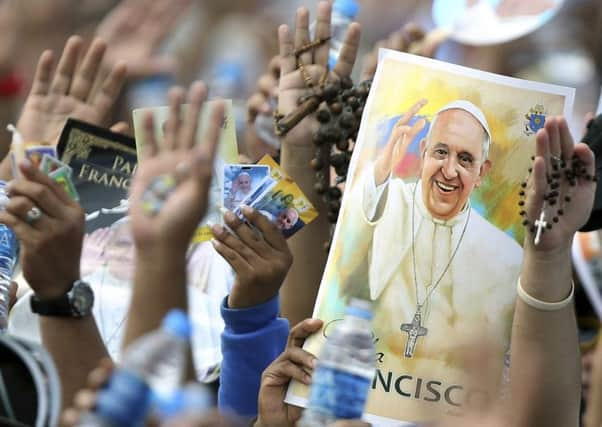Pope Francis uses prestige to campaign for change


Last week’s launch of Pope Francis’ encyclical Laudato Si: On the care of our common home is a huge contribution to the debate on the environment around the world. With it, the Scottish Catholic International Aid Fund (SCIAF) and the Catholic Bishops’ Conference of Scotland are given a renewed mandate to bring the concerns of poor people around the world right to the heart of decision-making in Scotland. What we must see now from Scotland is leadership on environmental issues, for the common good.
Catholic aid agencies like SCIAF accompany people in poor countries through the daily hardships they face as they are hit by climate change. Unpredictable rains leave families not knowing when to plant their seeds, while flash floods can wash away their fledgling crops or a drought can destroy their harvest.
Advertisement
Hide AdAdvertisement
Hide AdThrough our international networks such as Caritas and CIDSE, as well as through our national campaigning coalitions, we’ve been calling on world leaders to take action to promote the common good and address climate change for years.
Unfortunately, to date, their actions have fallen well short of what’s needed.
Last week SCIAF, along with CAFOD and many other groups, took part in a mass lobby of our new MPs to urge them to act on climate change. Now, with Laudato Si, we are given renewed hope that the strength of language used by Pope Francis on the failure of leadership in this arena will spur leaders into acting for the common good and in solidarity with the poorest people.
Pope Francis brings together 50 years of Catholic teaching on creation, justice and the common good.
He overlays this with a lyrical sense of the beauty of nature as a hymn to God, and a deep practical understanding of the impact a degraded environment has on the poorest people and on social cohesion. For me, his greatest insight is on the interconnectedness of all things and the inability of technology to address such complex problems. Only people, working and talking together, can find solutions to the challenges we face. There is no quick fix.
Pope Francis challenges us all to look at our lives and our actions in the light of the common good.
He clearly and explicitly links the mindset which permits social injustices and inequality to continue, with the causes of environmental degradation and climate change.
He reminds us that it’s the world’s poorest people who are bearing the brunt of a problem created by the mass consumption of the rich, driven by our unbalanced global economic system which puts profit before people. We have a responsibility to live more simply.
Advertisement
Hide AdAdvertisement
Hide AdThe encyclical is carefully timed to have an impact in the short term as well as contributing to Catholic teaching in the long term. In December a United Nations Summit in Paris will aim to secure a new global deal to tackle climate change. This will be a vital step in setting all nations on a course to keep global temperatures from rising by more than 1.5C. The summit must also result in poorer countries getting help to adapt to the climate challenges they face and enable them to develop on a low-carbon path.
The Catholic bishops of Scotland have been quick to respond positively to Pope Francis’ call. Archbishop Philip Tartaglia wrote on the day of its publication: “The encyclical – the highest form of papal teaching – puts care for the planet and environment in a moral context. ‘For human beings…to destroy the biological diversity… by causing changes in its climate… to contaminate the earth’s waters, its land, its air, and its life – these are sins’. From now on, our examination of conscience needs to include these things too.
“The encyclical is capable of really changing minds and hearts and lifestyles. I encourage everyone to pray over it, read it, ponder it, discuss it and put it into practice. It could – literally – help to save the world.”
Pope Francis’ call to action is challenging and direct, but it is founded on joy and wonder in the world, and the hope that, working and talking together, we can make the changes we need. Reinvigorated, SCIAF will be joining people of goodwill worldwide to urge Scottish, UK and global leaders to ensure that every country does its bit to tackle climate change and end the scourge of global poverty.
• Philippa Bonella is head of communications and education at the Scottish Catholic International Aid Fund, www.sciaf.org.uk, www.bcos.org.uk